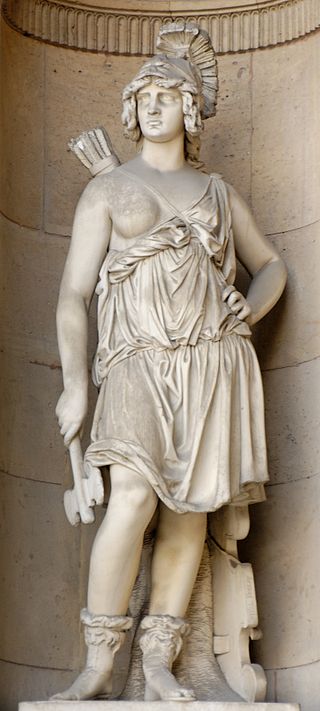
The Amazons were a group or race of female warriors in Ancient Greek mythology. Most of them are only briefly named in one or two sources, either as companions of Penthesilea at the Trojan War, or as being killed by Heracles during his 12 labours.

The Amazons were a group or race of female warriors in Ancient Greek mythology. Most of them are only briefly named in one or two sources, either as companions of Penthesilea at the Trojan War, or as being killed by Heracles during his 12 labours.
Many stories about Heracles and his 12 labours mention different Amazons being killed by him. These include Alcippe, Asteria, Celaeno, Deianira, Eriboea and Tecmessa. [1] Others, like Aella and Pantariste, fought Heracles but weren't killed.
John Tzetzes gives in his Posthomerica a list of Amazons who went with queen Penthesilea to the Trojan War and were killed in battle: Anchimache, Andro, Androdaixa, Antianeira, Aspidocharme, Chalcaor, Cnemis, Enchesimargos, Eurylophe, Gortyessa, Iodoce, Ioxeia, Oistrophe, Pharetre, Thorece, Toxoanassa, and Toxophone. [2]
Quintus Smyrnaeus, in his Posthomerica , also gives a list of the companions of Penthesilea at Troy who were killed there by the Greek warriors. Achilles killed Antandre, Antibrote, Harmothoe, Hippothoe, and Polemusa; Diomedes killed Alcibie and Derimacheia, Idomeneus of Crete killed Bremusa, Podarces killed Clonie after she had killed his comrade Menippus, Ajax the Lesser killed Derinoe after she had killed Laogonus, and Meriones killed Evandre and Thermodosa. [3]
Some Amazons are not known from literary sources, but only from inscriptions on vases. Areto is depicted on an Attic black-figure vase. [4] [5] Creusa is known from a vase from Cumae. [6] Iphito is only known from inscriptions. [5] Xanthippe is known from a red-figure vase. [7]

In Greek mythology, Hippolyta, or Hippolyte, was a daughter of Ares and Otrera, queen of the Amazons, and a sister of Antiope and Melanippe. She wore her father Ares' zoster, the Greek word found in the Iliad and elsewhere meaning "war belt". Some English translations prefer "girdle". Hippolyta figures prominently in the myths of both Heracles and Theseus. The myths about her are so varied it is thought that they may be about different women. The name Hippolyta translates as "she who unleashes the horses", deriving from two Greek roots meaning "horse" and "let loose".

Penthesilea was an Amazonian queen in Greek mythology, the daughter of Ares and Otrera and the sister of Hippolyta, Antiope, and Melanippe. She assisted Troy in the Trojan War, during which she was killed by Achilles or Neoptolemus. The asteroid 271 Penthesilea, discovered in 1887, was named in her honor.
In Greek mythology, Creusa may refer to the following figures:
In Greek mythology, Phaethusa or Phaëthusa was a daughter of Helios and Neaera, the personification of the brilliant, blinding rays of the sun. With her twin sister, Lampetia, she guarded the cattle of Thrinacia. She carried a copper staff with which she tended to her father's herd of sheep. She is sometimes listed as among the Heliades, daughters of Helios and Clymene who mourned for their brother Phaethon and were transformed into poplar trees. In the Argonautica however, set explicitly after Phaethon's death, she and her sister are still tending to their father's flock.
Clytius, also spelled Klythios, Klytios, Clytios, and Klytius, is the name of multiple people in Greek mythology:

Wilhelm Heinrich Roscher was a German classical scholar. He specialized in studies of Greek and Roman mythology.
In Greek mythology, Pantariste was an Amazon who fought on Hippolyte's side against Heracles and his troops.
In Greek mythology, Dion was a King in Laconia and husband of Amphithea, the daughter of Pronax. By his wife, he became the father of Orphe, Lyco, and Carya.

In Greek mythology, Cragaleus was a son of Dryops who dwelt in the land Dryopis next to a spring which was believed to have appeared at a place where Heracles hit the earth with his club.
In Greek mythology, Xanthippe is a name that may refer to:
In Greek mythology, Damasichthon was a king of Thebes and the son of Opheltes, purported to be son to Peneleos.
In Greek mythology, the name Socus may refer to the following personages:
In Greek mythology, Melite, daughter of Apollo, or alternatively Myrmex, was the eponym of the deme Melite in Attica. According to a scholiast on Aristophanes, Melite was a lover of Heracles who was initiated into the lesser mysteries during his stay in Attica; there was a temple of Heracles the Protector from Evil (Alexikakos) in the deme Melite. Heracles and Melite have been recognized in the figures portrayed alongside Demeter on the right half of the west pediment of the Parthenon.
In Greek mythology, Polystratus was a handsome youth beloved by Heracles.
In Greek mythology, the people of Athens were at one point compelled by King Minos of Crete to choose 14 young noble citizens to be offered as sacrificial victims to the half-human, half-taurine monster Minotaur to be killed in retribution for the death of Minos' son Androgeos.
Leimone (Λειμώνη) or Leimonis (Λειμωνίς) was, in an Ancient Athenian legend, the daughter of Hippomenes, a descendant of King Codrus. When her father caught her having illicit sex, he killed her lover and locked her in an empty house together with a horse. The animal eventually came to be starving and devoured Leimone. The remains of that house were still extant in the times of Aeschines, and the place was known as "At the Horse and the Maiden".
In Greek mythology, Munichus may refer to:
Karl Friedrich Heinrich Bruchmann was a German classical philologist.
In Greek Mythology, Antibrote was one of the Amazons, a race of warrior-women. She was one of Penthesilea's twelve companions at Troy.
According to Pseudo-Plutarch's Treatise on Rivers and Mountains, Lilaeus was an Indian shepherd who angered the gods and was punished for it.